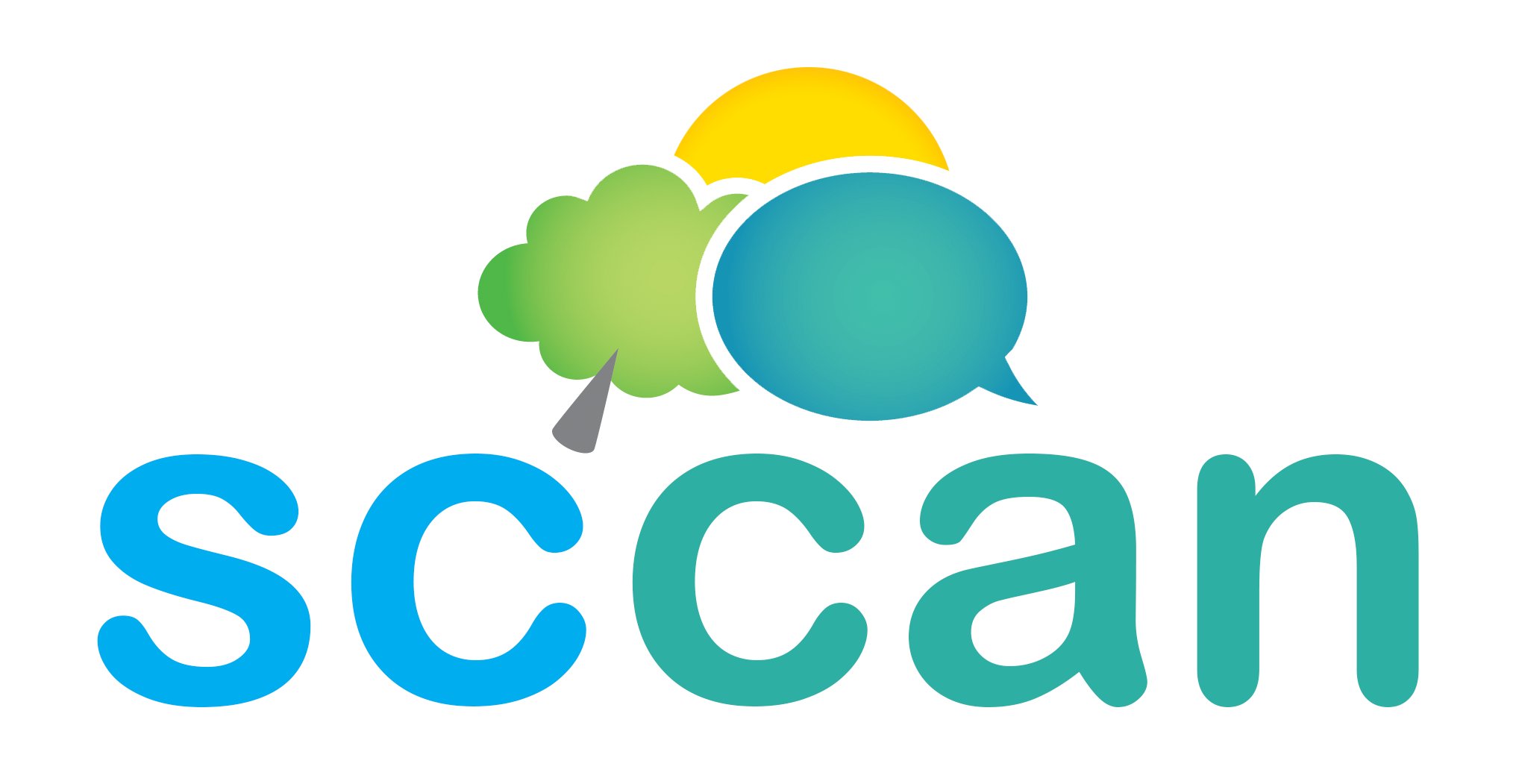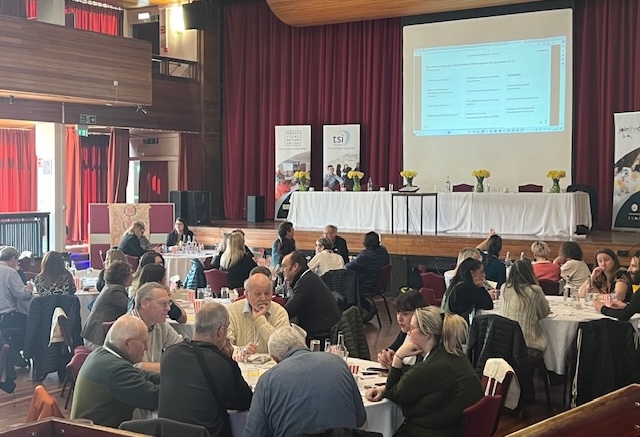SCCAN Story Weaver Lesley Anne Rose reflects on tsiMoray’s annual conference Join the Dots which took place at Elgin Town Hall on Thursday 21 March, 2024.
“Community stuff is messy.”
The spring equinox sits halfway between mid-winter and mid-summer and marks a point in the year when the daylight and night time are of equal length. It’s a time when the year turns – at this point towards spring and the promise of summer. It’s an optimistic moment associated with spring flowers and Easter. The spring equinox sunshine was out in force in Elgin to welcome attendees to tsiMoray’s annual conference – Join the Dots. A day of connecting ideas and people in person at Elgin Town Hall.
I’d spent the morning of the previous day interviewing a man about Old Torry, a harbourside community in Aberdeen where he grew up, but which was demolished in the 1970s to make way for the infrastructure required for the oil and gas industry. It wasn’t the bricks and mortar of his childhood home he shared with me that he’s missed ever since being forced to move, but the sense of community and belonging. All of which takes time and a particular set of circumstances to create, but can be destroyed in an instant.
Building belonging was one of the conference’s priorities and ‘windows into the future.’ This theme was built into the morning’s panel presentations under pinned by the premise that wellbeing begins with a sense of belonging.
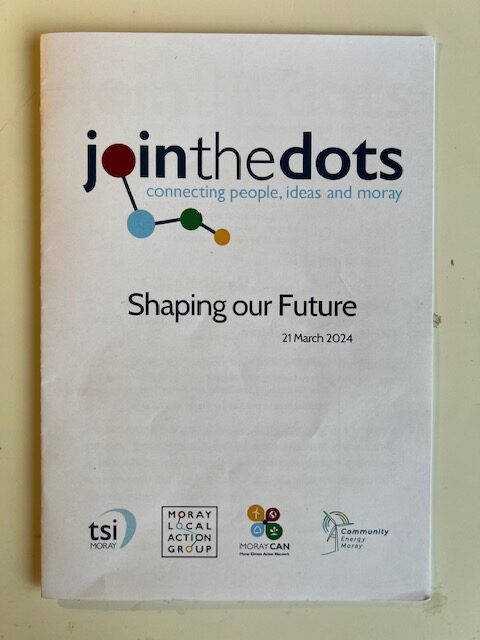
The first speaker to address this theme was Dr Claire Bynner a Lecturer in Social Justice and Community Action at the University of Edinburgh. Claire spoke of the negative impacts of the covid-19 pandemic on mental health and the sharp increase in loneliness across the country. With over a third of the population experiencing feelings of loneliness, and the clear detrimental impact on health and wellbeing this has, Claire suggested that another public health crisis is gathering force. Which is where community comes in.
The pandemic taught us that community matters. Those who felt connected to their local community during the early stages fared better in terms of their mental health, than those who didn’t. The pandemic motivated volunteers within communities who connected over shared moral concerns, proving that shared interests have a role to play in building community identity, alongside a sense of place.
“Solidarity, not charity.”
Pandemic slogan
It’s well documented that volunteering is good for wellbeing. The act of supporting someone contributes to a sense of belonging, with the benefits evident for both the giver as well as the person receiving support. The giver experiences feelings of having made a difference, affirmations of being appreciated and worthwhile. While the receiver feels supported. Claire highlighted the importance of an equal relationship and swapping roles to avoid adding an unwelcome sense of disempowerment into the emotional mix of giving and receiving. And that a balance must be struck. Too little time ‘giving’ means people don’t feel the benefits, but too much causes burnout. These acts of helping each other, Claire believes, are one of the first steps in building ‘belonging’ into communities. The impact of the pandemic in forcing the hand of so many to help where they hadn’t before has had a profound effect on creating a sense of identity and focus on wellbeing for those lucky enough to be in communities where they had the possibility and potential to make a difference.
The next panel speaker was Christine Fairbairn, Engagement and Membership Lead with Social Rural Action. Christine reminded us that 98 per cent of Scotland is rural. She shared details of the bi annual Scottish Rural and Island Parliament and Community Learning Exchanges. Both of which are spaces to share stories and generate a sense of collective voice and connection. Christine also reminded us of the importance of village/community halls as spaces to bring people together and foster feelings of belonging. These spaces became especially important during the pandemic, but are now bearing the brunt of a rise in energy costs. Community halls are places where people can get involved and as such foster a sense of belonging. They are spaces where young and old can feel safe and often share the reality of how things are for them.
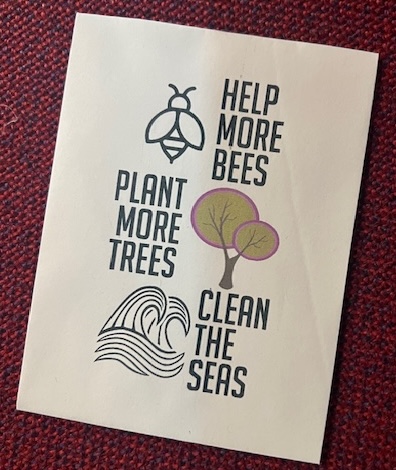
Jess Pepper, is the Founder and Director of Climate Café CIC which started life as a community conversation about climate change and has rapidly grown into a movement of informal and inspiring spaces to come together and get involved in climate action. Jess features on the BBC list of 100 inspiring and influential women from around the world for 2023 and is one of 28 Climate Pioneers ahead of COP28. She spoke of the Climate Café and how it quickly became a space to hold the intergenerational conversations surfacing around climate.
From small beginnings in Perth and Kinross, there are now Climate Cafes across the globe. Community led, at times hyper local in their conversations, while at others global, the cafes bring together people who know each other and who can do what to make things happen. All of which brings with it a sense of agency, engagement and empowerment.
However, Jess is the first to admit that:
‘Community stuff is messy’.
She highlighted that communities are solution orientated, but their work is often unseen, unheard, undervalued and under resourced. And that ever since the Communities Empowerment Act more and more is put on communities and volunteers, leaving little time for reflection. All of which makes supporting and celebrating what people do important, as well as collecting evidence of impact (and eating cake!).
In reference to the headline for day, Jess talked of ways to ‘join the dots’ and ensure inclusivity. If communities are inwards looking, and only connect through people reflecting each other, then lots of people are left out. She highlighted the need for active effort to reach out to those ‘not like us’ as well as the challenges of sustaining feelings of care and empathy post pandemic.
The second theme of the day was ‘Using AI and Technology for Good’. Calum McDonald, Engagement Officer at the Scottish AI Alliance was the panel speaker invited to address AI at a local community groups level.
The term AI was first coined in 1956. It reflects the idea of trying to make computers perform tasks that it was previously thought needed human intelligence to undertake. Calum assured us that the AI genii is well and truly out of the bottle, and like it or not, we all interact with it on a regular basis. The speed at which we engaged with Generative AI (ChatGPT hit one million users in five days) is an indication of just how far reaching it will become in our lives.
However, if technology is reflective of society, how it shapes the future depends on how we use it. Discussions have to be had about AI and society. Discussions shaped by the people it impacts across all sectors, industries and societies. Callum urged that ethical technology should respect and reflect our values and human rights. But also the need for us all to find out about how it works. Like any tool, the results you get depend on how you use it. And that an AI strategy is increasingly important for all organisations.
To find out more, Callum shared details of Elements of AI a free online course from the University of Helsinki.
The third theme of the day was the Future of Fundraising with Bridie Ashrowan, Chief Executive of Edinburgh Voluntary Organistions’ Council. speaking to it. Funding is a critical issue for anyone working at a community level. It’s an environment in which increased pressure is being put on volunteers and the ability to secure funding for periods of longer than a year is becoming harder and harder. All of which means we sometimes feel stuck on a funding treadmill.
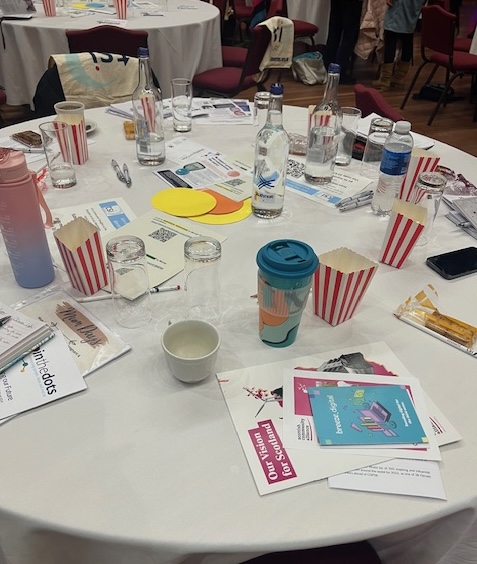
In between presentations there was generous time to connect through round table discussions, a networking lunch and Market Place stalls around the building. As well as plenty of inspiration on hand, such as the film of Findhorn Bay Art’s Combine to Create to project, which put artists and creative practitioners into the heart of communities during and post pandemic:
The take aways from the day were many. We were urged to make space in our heads by letting go of old ways of thinking to make room for new. To build foundations of care and wellbeing into our work, and to open up dialogues underpinned by dignity, respect and deep listening.
Community stuff is complex and often fragile. But also has an important role to play in our wellbeing. As the man who I’d met previously, whose community was flattened to make way for oil and gas, proved to me – community may be messy, but we sometimes don’t realise how important it is until it’s gone.
Lesley Anne Rose
